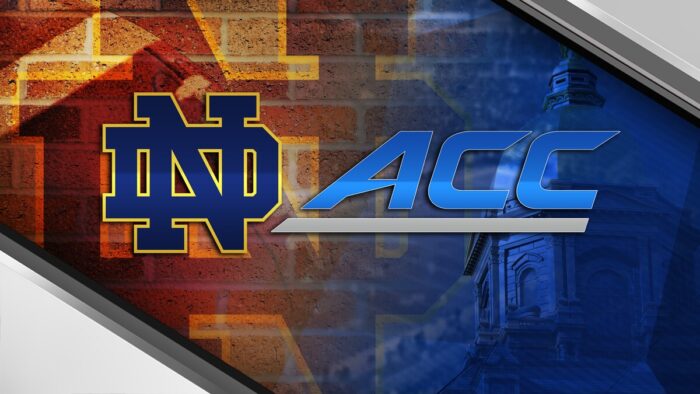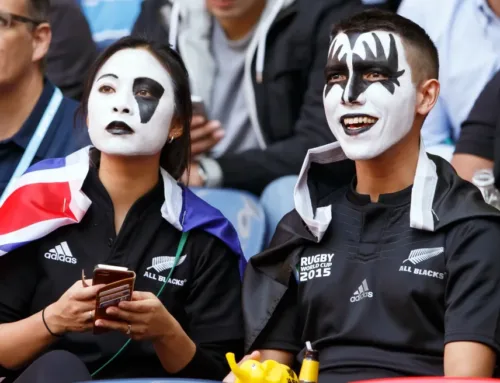It’s been a pretty standard drumbeat ever since the announcement came down in July that for one season, Notre Dame football would play a conference schedule, in the ACC. It might get a little louder over the next week-plus, as we lead up to the ACC title game between the Irish and Clemson.
“Will they make this permanent?”
No. They won’t.

I could just leave it there, but you will probably insist on some reasons. Fine. Here we go.
ND doesn’t need to be in the ACC to make the CFP
We already know Notre Dame can make the College Football Playoff without playing a full conference schedule, because they did it in 2018. To make the Playoff, the selection committee has been clear – you need to play a Power 5 schedule.
But that doesn’t mean you need to play a conference schedule. Notre Dame plays 9 or 10 Power 5 teams every year. (They had 10 originally scheduled this year prior to COVID-19, and will end up with 10 anyway.) That’s in line with what most CFP contenders play; the only difference is the vast majority of their 9 or 10 come against the same league, while ND plays an average of 5 from the ACC, 2 from the Pac-12, and a sampling from the other 3 power leagues.
The next 2 seasons, Notre Dame will only play 9 Power 5 teams, but there’s a ‘but’:
- In 2021, ND will play Cincinnati, currently a top-10 team. If Luke Fickell is still the coach, and even if he’s not, the Bearcats will almost surely be as good or better than most Power 5 squads, so that’s a de facto Power 5 game if you ask me. (Toledo and Navy are the other G5 squads on the slate.)
- In 2022, Notre Dame plays both Ohio State and Clemson (the Buckeyes on the road). If ND somehow beats both those teams, and even if they beat just one, they’ll likely have proven their Playoff bona fides, even though the presence of UNLV, Marshall (who was also ranked until Saturday’s upset loss, for what it’s worth) and Navy ensure a max of 9 Power 5 opponents. The full schedule has not yet been announced.
- (In 2023, by the way, ND plays both OSU and Clemson again, this time with Clemson on the road, so the same logic will hold, although as with ’22, the full schedule has yet to be announced.)
The point is, ND has been able to fill its schedule with Power 5 teams without being in a conference, and will continue to be able to do so, with some help from the ACC arrangement. As long as the ACC is happy with what they get from ND – and there’s never been an indication from anyone with decision-making power that they’re not (sorry, Pat Narduzzi, not up to you) – the Irish need not be in the league for football.
By the way, this reasoning will hold even truer after 2025, when most people expect the Playoff to expand to eight teams. At that point, college football will forever remove any thought that you need to win a conference to play for a title. (A thought that should have gone away with Nebraska 2001, Alabama 2011, Ohio State 2016, and Alabama 2017, but that’s another story.)
Some schools seem to be preparing for this eventuality by scheduling even more ambitiously out of the conference. Most notably, Georgia has future schedules that include Texas and Clemson (2029), Clemson and Ohio State (2030), and Ohio State and Oklahoma (2031), on top of their normal SEC + Georgia Tech slate. If Power 5 teams are going to be playing each other more often in hopes of drawing higher attendance, that will only help ND fill its schedule.
ND’s schedule is more difficult and more interesting outside a conference
This should’ve been self-evident before 2020. I’m fond of pointing this out, but just to reiterate: There are 3 teams ND effectively replaces ACC teams with on their schedule in exchange for giving up a conference title shot – Navy, USC and Stanford. The former two were ranked in the final CFP rankings last year. This matched the total number of ranked teams from the entire ACC – Clemson and Virginia (the latter of which ND played and beat anyway).
In any case, it became crystal clear this year: Notre Dame’s schedule is tougher outside a conference than in one. (This is why even if you hate ND for not being in a conference, you should still prefer they not be in one if you don’t want to see them in the Playoff.)
The Irish’s original 2020 slate included currently ranked foes Wisconsin and USC, both away from home, on top of the game against Clemson that we all watched on Nov. 7. Additionally, a much-improved Arkansas team was slated to come to South Bend, and the usual battles with Navy and Stanford would’ve appeared on the slate as well. ND also had six ACC games on the original schedule. (Remember, the Clemson game was on the slate already, so being in the ACC this year did not add that game.)
Luckily, one of the four games added to ND’s 2020 schedule by the ACC was the visit to North Carolina, which worked out to be a relevant and fairly exciting game against a ranked team. But other than that, the Irish’s reworked 2020 slate, by comparison to what was supposed to be the schedule, has not been particularly exciting or interesting on paper.
Would you want to do this every year? I would not. Give me those home-and-home series against teams from all over college football rather than seeing, no offense intended, the likes of Boston College, Pittsburgh and Duke every year rather than once every three.
Not a factor: Money
No one who needs to hear this is going to, but just for the record, Notre Dame is leaving a ton of money on the table by remaining a football independent. Repeat: A ton.
You can see the full figures in this linked article, but the summary is this: The least amount of money distributed to a Power 5 school this last year was $27.6 million, to an unknown ACC school. (The ACC had payouts ranging from $27.6 to $34 million. No explanation was given as to the disparity, but I’m assuming newer additions Louisville, Syracuse and Pittsburgh might get a bit less than the legacy members.)
Notre Dame, meanwhile, received $6.8 million from the ACC for their non-football sports and their 1/15th stake in the ACC Network. Their NBC deal is widely reported to be worth $15 million per year. For you math whizzes, that adds up to $21.8 million – just under $6 million less than any Power 5 school.
The Big Ten, for instance, distributes oceans more money to its schools – $55.6 million! – than Notre Dame gets. The SEC is around that number, and that will only go up when they switch from CBS to ABC/ESPN. Even the Big 12, often an afterthought in these discussions, is around $40 million per school, and the Pac-12 is at about $32 million per.
That doesn’t even factor in the healthy revenue bump any conference, and by extension ND, would enjoy if the Irish decided to abandon all morality and reason and join a conference, even the one that once tried to blackball its football program out of existence.
I don’t bring this up to talk about how ND is magnanimously passing up money they could otherwise earn. I’m sure no one who’s ever dealt with the school would claim that. However, the point is that if money was the only driving factor in the decision to play in a conference or not, ND would already be in one. The school has consistently stated that it values its independent status as a core part of its identity, and nothing it’s done would suggest that will change any time soon – especially with the aforementioned expected Playoff expansion coming.
So that’s that
The ACC, as you’d expect, helped out a member school when it needed a football schedule. Both sides, I’m sure, appreciated what that decision brought; the ACC got a revenue bump, the cachet of having Notre Dame all to itself all year, and the season-long Notre Dame/Clemson discussion. ND got a football schedule and, quite possibly, a Playoff berth that they certainly would not have gotten had they tried to cobble a slate together without the ACC. (As I’ve outlined above, they also got a bit of a revenue bump.) And both sides will happily move back to ‘normal’ next fall, when a regular and COVID-free college football campaign can hopefully be staged.
Many college football fans insist there must be more. But there really doesn’t need to be. ND will play 5 ACC schools next year, and the year after, and on and on, and they’ll continue to be, officially anyway, independent.





Nice job slipping in the Pat Narduzzi comment
Pat Narduzzi’s opinions don’t even matter to Mrs. Narduzzi.
The boringness of the ACC schedule is a huge deal to me. The original 2020 schedule wasn’t great by ND’s normal standards, but even so, we’d have a first-time SEC opponent (Arky), an absolute blast of a game at Lambeau (Wisconsin), and a trip to LA (Southern Cal). With the ACC schedule, we get a bazillion trips to and from various mid-sized North Carolina towns. No thanks.
I guess fans of other teams just get used to repetitive scheduling, but I’m already tired of it after one year. If there’s any way we can reduce the number of games we commit to the ACC, we should do so.
Zero would be preferable.
We were playing Pitt and BC every year anyway, so an additional 3 football games in exchange for the ACC basketball isn’t a problem for me – but couldn’t agree more with the tenor of the comment.
Yeah, I agree. Personally, I don’t care if they replace Purdue with Wake or Duke every year, it’s basically the same. I can understand how some miss the traditional Big 10 rivals, and I would love to see ND schedule the two Michigan teams somewhat regularly, but such is life these days with college football that traditional rivals are pulled apart by squabbling and conferences.
And, as Andy says, for the trade off ND gets for all the other sports, it’s well worth it.
Just leaving it here if you haven’t heard. scUM vs. Ohio St. has been cancelled. Potentially huge implications for playoff and ND.
Just another reason to be glad we didn’t join the Big10
Remember how the B1G shot down Nebraska playing an OOC game because once the conference rules for the season are set, they can’t be changed?
Well guess what?
LOL, I totally forgot about that. I can see how some B1G would want to change the rules in order to have a chance to get a member into the playoff, but it has to rub some teams the wrong way to change the rules now.
It’s going to rub Dabo the wrong way and then he’ll start campaigning for the ACC to cancel their championship game. ACC probably would be inclined to do that too, being as you would think a 10-0 ND and 9-1 Clemson are definitely both getting in this year. (But if Clemson loses again to ND….)
The other example is Wisconsin. They were the toast of the B1G West for a couple of weeks but very early on (even before they lost to N’western) they potentially weren’t going to be eligible for the B1G championship and I never heard anybody asking for the rules to be changed.
Now I get it that at this point Ohio St. has already clinched a spot and Wisconsin still had a lot of work to do to win the West, but the point is this smacks of favoritism and elitism for sure.
I imagine Dabo will wait and see what the B1G does. He has to be at least a little careful about pushing for cancellations given his hissy fit about FSU.
But if it looks like Ohio State will make the playoff without playing in the B1GCG — as they would based on current rankings — he might start whining about how having to rematch ND isn’t fair, especially when Clemson already played twice as many games as Ohio State.
lol, yea no way they don’t change the rules to get OSU in the conference champ game so they can get OSU into the playoffs.
The funniest possible upset in college football history would be the Big Ten changing the rules, sneaking OSU in, and then Northwestern upsetting them. I cannot imagine enjoying a college football result more than that, other than ND winning the ACC Championship in its 1 and only season in the league.
Never thought I would say this, especially as I was around when an Ara P coached Northwestern team beat us four (4!) straight years, but — in that case, go Wildcats!
Does Clemson really still have a shot to make the playoffs if they lose to us again?
Best-case scenario for us:
We win stay at #2, bama wins they stay #1.
Iowa state wins (their 2 losses are actually to ranked teams and while it may be close, they would have a conference championship to be the tie-breaker) and they jump into the top 4 – maybe even #3 (with OSU getting dinged for not playing many games).
And then OSU gets in at #4.
Iowa st at #3 would be best-case scenario but I think even OSU is weaker this year than most years and we could play with them just fine. I’d much rather play them than Clemson again. It’s tough to beat a team 3x in a row.
And if OSU is #4, they would be a strong #4 and give Bama a game. – Though seriously is anyone beating Bama this year with them scoring so many points?
Here’s a scenario I’m wondering about. So current rankings are 1) Bama, 2) ND, 3) Clemson, 4) Ohio State.
The B1G doesn’t let Ohio State play in Indy. Maybe gives them one more cupcake game to placate them, which they win in a blowout.
Dabo starts yelling about how it’s not fair Clemson and ND have to rematch when Ohio State hasn’t played a single opponent of that caliber, and has played half the number of games Clemson and ND did. ACC caves and cancels the ACC championship.
Bama beats Florida, as expected.
Wouldn’t that just freeze the rankings as they are now? Seems to me like an outcome the P5 could engineer pretty easily, and that would keep the SEC, ACC, and B1G happy.
0% chance acc cancels the championship. There are contracts in place that would cost the league way too much money. Only way that game doesn’t get played is if Clemson/ND get covid. If Dabo wants that game cancelled, he’s gonna have to have (or fake) a covid outbreak.
Well, what is the common thought about how the ACC gets both teams in? ND loses but it’s a close, down to the wire game. How about we PLAY the game and both coaches and administrations have a gentleman’s agreement. For 60 mins both teams actively refuse to score. The best way to do this would be to take a knee every down and punt on 4th, never moving the ball but you could also just run the ball up the middle every play. Make sure no one gets hurt.
Then, with the score tied 0-0 after regulation the game goes to overtime. 1st-4th OT periods go exactly as the game went, neither team scoring. Finally in the 5th OT, ND allows clemson to score the 2pt conversion. ND immediately lines up to kick a FG on 1st down and Doerer puts it through the uprights. Clemson wins in 5OT by a score of 2-0.
How would Clemson score just a 2 point conversion? That would have to be after a Clemson TD, yes? So it’d be 8 points for Clemson and then, by making a FG, 3 points for ND. So 8-3 is the score of the scenario you just posited.
Rule change last year. Starting in the 5th overtime period, the ball is placed on the three yard line and the offense has one play to score a 2-pt conversion. Kicks are not allowed.
Ahhh.
“ND immediately lines up to kick a FG on 1st down and Doerer puts it through the uprights.”
^How does this happen then?
Iowa State in the playoff would be the biggest joke in NCAA history. They have a worse resume than Coastal Carolina. The committee should be embarrassed at how they’ve ranked those two teams. Coastal has wins over two ranked teams, including one that beat Iowa State by 3 scores, and they aren’t even in a spot to play in a New Year’s Bowl.
How is Iowa st’s resume (assuming they beat Oklahoma in two weeks) worse than say OSU’s?
They’ve lost twice, including by 17 points to Louisana. Resume or not, I can’t see them being placed above an undefeated Ohio State by the committee, even if tOSU has played six games.
Yep, 2 losses, 1 to a Sun Belt team (a conference that the committee has indicated they do not think is any good) by 3 scores. They have only 1 win over a team ranked higher than Coastal Carolina’s 2 best wins (including a win over the team that beat Iowa State by 17).
If you want to look at advanced metrics, Iowa State isn’t even a top 10 team in any of them.
It would be pretty wild, if in a year where they’re only going to play 11 games, this was when they decided to put a 2 loss team into the Playoff.
“Sun Belt team (a conference that the committee has indicated they do not think is any good)”
You do realize that the sun belt team they lost to is ranked 19th right? I’m not sure how that is the committee thinking they aren’t any good. Maybe you are confusing them with another team?
The Sun Belt team they lost to got beaten by an undefeated Coastal Carolina team, that has as many wins over ranked teams as Iowa State.
So you are saying the #19 team (sun belt team) is really bad because they lost to the #13 team, and the #13 team has wins over two ranked team – which would be more wins over ranked teams as OSU? Iowa st. may be significantly overrated, but your argument is incredibly weak.
Anyone that plays in a p5 conference immediately has a better resume than any team that plays in a G5 conference. The amount of prep and type of athletes you need for a major program dwarf the G5. So right out of the gate, with all things being equal ISU deserves it more than CC. But you’re also forgetting ISU has already beaten Oklahoma, a team who has been MURDERING the conference the last 6 weeks. That’s not nothing. And if they end up winning the XII then they would have done it twice. That’s three data points where ISU should get in over Coastal. They’re a great story, but they’ll never be in the playoff.
And yet Iowa State lost by 17(!!!) to a Sun Belt team. And the Sun Belt went 3-0 this year against the vaunted Big 12.